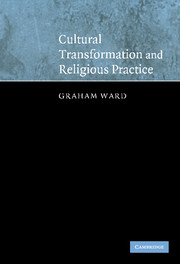Book contents
1 - The governing question I: from what place does theology speak?
Published online by Cambridge University Press: 15 December 2009
Summary
In order to begin an enquiry into the relationship between Christian theology, cultural transformation and the formation of public accounts of what is true, I wish to pose and examine a specific question in this opening section: from where does theology speak? Since we are concerned here with the effects of discursive practices – writing sermons and treatises, church attendance, the living out of a Christian ethic, liturgies, acts of piety, etc. – then there are two aspects to answering this question.
The first is the personal – that is, it is persons who do these things in the context of and in relation to other persons. Even the solitary reading of the Bible or the act of lighting a candle is rendered meaningful only with respect to wider relational fields: my reading of the Bible is a discipline my tradition first informs and then (it is hoped I discover) is necessary for my salvation, for example; or I have been taught that my lighting a candle can be a significant part of an act of intercession or remembrance. These solitary acts only make sense to the persons doing them when they are viewed contextually, that is, in terms of wider intersubjective practices and the institutions that structure and facilitate them. As such solitary acts have public meanings and communal significances. They are not divorced from the institutions that have judged these acts significant, and disseminated this judgement among those attached to and constituting these institutions.
- Type
- Chapter
- Information
- Cultural Transformation and Religious Practice , pp. 12 - 60Publisher: Cambridge University PressPrint publication year: 2004



